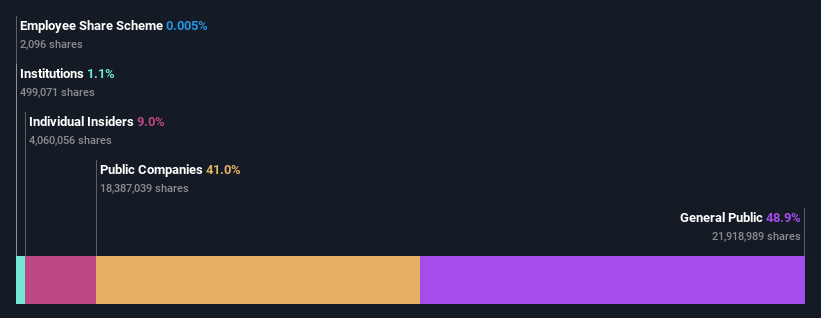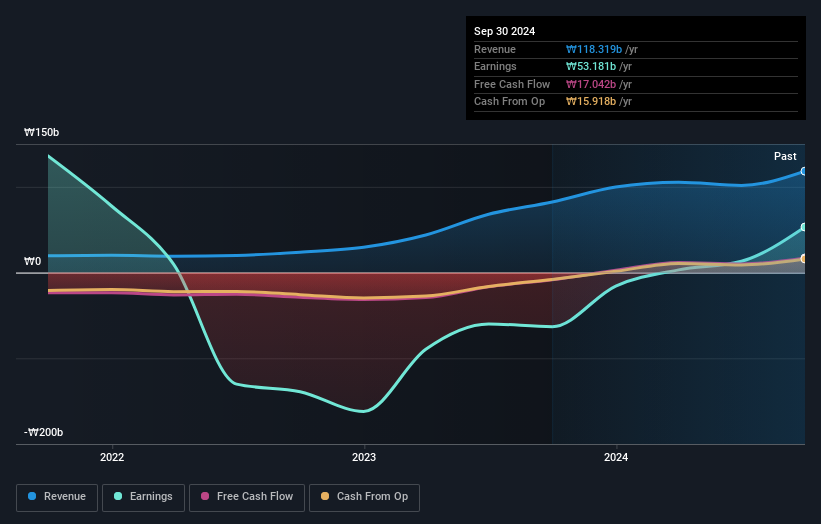- South Korea
- /
- Entertainment
- /
- KOSDAQ:A217270
Individual investors among Neptune Company's (KOSDAQ:217270) largest shareholders, saw gain in holdings value after stock jumped 11% last week

Key Insights
- The considerable ownership by individual investors in Neptune indicates that they collectively have a greater say in management and business strategy
- The top 4 shareholders own 50% of the company
- Ownership research, combined with past performance data can help provide a good understanding of opportunities in a stock
A look at the shareholders of Neptune Company (KOSDAQ:217270) can tell us which group is most powerful. With 49% stake, individual investors possess the maximum shares in the company. In other words, the group stands to gain the most (or lose the most) from their investment into the company.
Clearly, individual investors benefitted the most after the company's market cap rose by ₩24b last week.
Let's take a closer look to see what the different types of shareholders can tell us about Neptune.
View our latest analysis for Neptune

What Does The Institutional Ownership Tell Us About Neptune?
Many institutions measure their performance against an index that approximates the local market. So they usually pay more attention to companies that are included in major indices.
Institutions have a very small stake in Neptune. That indicates that the company is on the radar of some funds, but it isn't particularly popular with professional investors at the moment. So if the company itself can improve over time, we may well see more institutional buyers in the future. When multiple institutional investors want to buy shares, we often see a rising share price. The past revenue trajectory (shown below) can be an indication of future growth, but there are no guarantees.

Neptune is not owned by hedge funds. Looking at our data, we can see that the largest shareholder is Kakao Corp. with 41% of shares outstanding. For context, the second largest shareholder holds about 5.5% of the shares outstanding, followed by an ownership of 3.3% by the third-largest shareholder.
Our research also brought to light the fact that roughly 50% of the company is controlled by the top 4 shareholders suggesting that these owners wield significant influence on the business.
While it makes sense to study institutional ownership data for a company, it also makes sense to study analyst sentiments to know which way the wind is blowing. As far as we can tell there isn't analyst coverage of the company, so it is probably flying under the radar.
Insider Ownership Of Neptune
The definition of an insider can differ slightly between different countries, but members of the board of directors always count. Company management run the business, but the CEO will answer to the board, even if he or she is a member of it.
I generally consider insider ownership to be a good thing. However, on some occasions it makes it more difficult for other shareholders to hold the board accountable for decisions.
We can report that insiders do own shares in Neptune Company. It has a market capitalization of just ₩247b, and insiders have ₩22b worth of shares, in their own names. This shows at least some alignment, but we usually like to see larger insider holdings. You can click here to see if those insiders have been buying or selling.
General Public Ownership
The general public, who are usually individual investors, hold a 49% stake in Neptune. While this group can't necessarily call the shots, it can certainly have a real influence on how the company is run.
Public Company Ownership
It appears to us that public companies own 41% of Neptune. This may be a strategic interest and the two companies may have related business interests. It could be that they have de-merged. This holding is probably worth investigating further.
Next Steps:
I find it very interesting to look at who exactly owns a company. But to truly gain insight, we need to consider other information, too.
I like to dive deeper into how a company has performed in the past. You can access this interactive graph of past earnings, revenue and cash flow, for free.
Of course this may not be the best stock to buy. Therefore, you may wish to see our free collection of interesting prospects boasting favorable financials.
NB: Figures in this article are calculated using data from the last twelve months, which refer to the 12-month period ending on the last date of the month the financial statement is dated. This may not be consistent with full year annual report figures.
Valuation is complex, but we're here to simplify it.
Discover if Neptune might be undervalued or overvalued with our detailed analysis, featuring fair value estimates, potential risks, dividends, insider trades, and its financial condition.
Access Free AnalysisHave feedback on this article? Concerned about the content? Get in touch with us directly. Alternatively, email editorial-team (at) simplywallst.com.
This article by Simply Wall St is general in nature. We provide commentary based on historical data and analyst forecasts only using an unbiased methodology and our articles are not intended to be financial advice. It does not constitute a recommendation to buy or sell any stock, and does not take account of your objectives, or your financial situation. We aim to bring you long-term focused analysis driven by fundamental data. Note that our analysis may not factor in the latest price-sensitive company announcements or qualitative material. Simply Wall St has no position in any stocks mentioned.
About KOSDAQ:A217270
Flawless balance sheet and good value.


